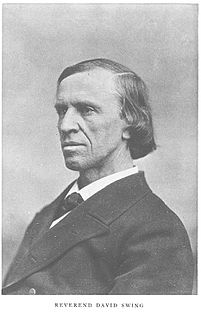A Quote by Malcolm Muggeridge
The hallmark of religion is to distrust claims made for mortal men. It is in ages of great religious faith that great skepticism can find expression.
Related Quotes
Today courts wrongly interpret separation of church and state to mean that religion has no place in the public arena, or that morality derived from religion should not be permitted to shape our laws. Somehow freedom for religious expression has become freedom from religious expression. Secularists want to empty the public square of religion and religious-based morality so they can monopolize the shared space of society with their own views. In the process they have made religious believers into second-class citizens.
Preachers are not sermon makers, but men makers and saint makers, and he only is well-trained for this business who has made himself a man and a saint. It is not great talents nor great learning nor great preachers that God needs, but men great in holiness, great in faith, great in love, great in fidelity, great for God - men always preaching by holy sermons in the pulpit, by holy lives out of it. These can mold a generation for God.
The idea, therefore, that religious faith is somehow a sacred human convention—distinguished, as it is, both by the extravagance of its claims and by the paucity of its evidence—is really too great a monstrosity to be appreciated in all its glory. Religious faith represents so uncompromising a misuse of the power of our minds that it forms a kind of perverse, cultural singularity—a vanishing point beyond which rational discourse proves impossible.
Science has only two things to contribute to religion: an analysis of the evolutionary, cultural, and psychological basis for believing things that aren't true, and a scientific disproof of some of faith's claims (e.g., Adam and Eve, the Great Flood). Religion has nothing to contribute to science, and science is best off staying as far away from faith as possible. The "constructive dialogue" between science and faith is, in reality, a destructive monologue, with science making all the good points, tearing down religion in the process.
Trouble arises when either science or religion claims universal jurisdiction, when either religious dogma or scientific dogma claims to be infallible. Religious creationists and scientific materialists are equally dogmatic and insensitive. By their arrogance they bring both science and religion into disrepute.
An important distinction can be made between religion and spirituality. Religion [is] concerned with faith in the claims to salvation of one faith tradition... Spirituality is concerned with qualities of the human spirit, love and compassion, patience, tolerance, forgiveness, contentment, a sense of responsibility, a sense of harmony, that bring happiness both to self.
It is often lamented by the churchmen that Washington and Lincoln possessed little religion except that found in the word 'God.' All that can here be affirmed is that what the religion of those two men lacked in theological details it made up in greatness. Their minds were born with a love of great principles... There are few instances in which a mind great enough to reach great principles in politics has been satisfied with a fanatical religion... It must not be asked for Washington and Lincoln that, having reached greatness in political principles, they should have loved littleness in piety.
I distrust Great Men... I believe in aristocracy, though... Its members are to be found in all nations and classes, and all through the ages, and there is a secret understanding between them when they meet... They are sensitive for others as well as for themselves, they are considerate without being fussy, their pluck is not swankiness but the power to endure, and they can take a joke.
The great religious ages were notable for their indifference to human rights... not only for acquiescence in poverty, inequality, exploitation and oppression, but also for enthusiastic justifications for slavery, persecution, abandonment of small children, torture, and genocide... Moreover, religion enshrined hierarchy, authority, and inequality... It was the age of equality that brought about the disappearance of such religious appurtenances as the auto-da-fe and burning at the stake.
































